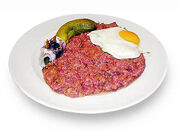The first known use of the term "Lobscouse" dates back to 1706 (Webster). However, it has also been indicated that pilgrims ate it on the Mayflower (1620) when they had a turn at cooking a hot meal.
The origin of the term is unknown, but there are several theories. English origin seems to be the most probable (possibly "lout’s course" via "lob’s course" to "lobscouse"). The German version of the dish, which a bit different from the Scandinavian and English one is called "Labskaus", and low German origin is considered the second most probable origin. Another possibility is Baltic origin. "Labs kausis" in Latvian and "labas káuszas" in Lithuaninan, which both mean "good plate/bowl". Lobscouse is also popular in Norway (lapskaus), Denmark (labskaus, skipperlabskovs) and Sweden (lappskoj, lapskojs og lobskås).
Lobscouse was popular by Northern European sailors with bad teeth (sometimes caused by scurvy), which also brought the recipes home. In Norway the dish became popular in the whole country, whereas it in Germany became popular in the Northern part. In England it became popular in the Liverpool area.
A "pan of scouse" became a common meal in working class Liverpool. A thickened stew, usually of mutton or lamb with vegetables[1] slow cooked to tenderise cheap cuts of meat. The shortened of the word is "scouse" and is part of a genre of slang terms which refer to people by stereotypes of their dietary habits, e.g. Limey, Rosbif (American and French slang respectively for the English), and Kraut (an English colloquial ethnonym for a German).

The word Scouse was originally a variation of "lobscouse"[2], the name of a traditional dish of Scouse made with lamb stew mixed with hardtack eaten by sailors. Alternative recipes have included beef and thickened with the gelatin sauce found in cowheel or pig trotter in addition to various root vegetables. Various spellings can still be traced, including "lobscows" from Wales, and some families refer to this stew as "lobby" rather than scouse, as in the Potteries (Stoke-on-Trent), where a 'bowl of lobby' is a welcome meal on a cold winter's night. In Leigh, between Liverpool and Manchester, there is even a "Lobby shop". The dish was traditionally the fare of the poor people, using the cheapest cuts of meat available, and indeed when no meat at all was available scouse was still made, but this "vegetarian" version was known as "blind scouse".[citation needed] The term remained a purely local word until its popularisation in the sitcom Till Death Us Do Part, which some also believe to have introduced stereotypes about Liverpudlians. It is also thought that there may once have been a giant man that came from the area called "Jon Scouse".[3]